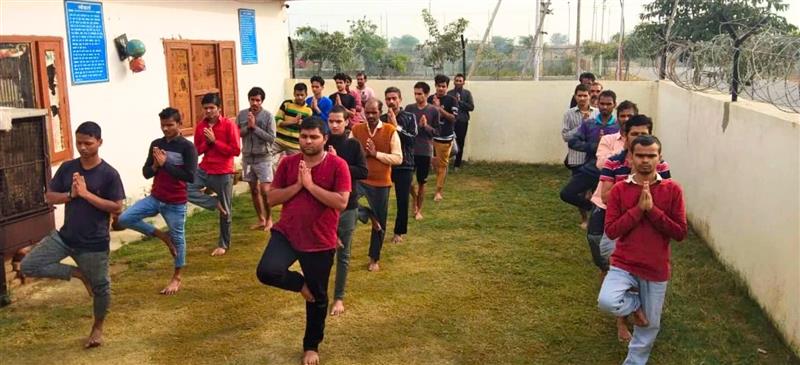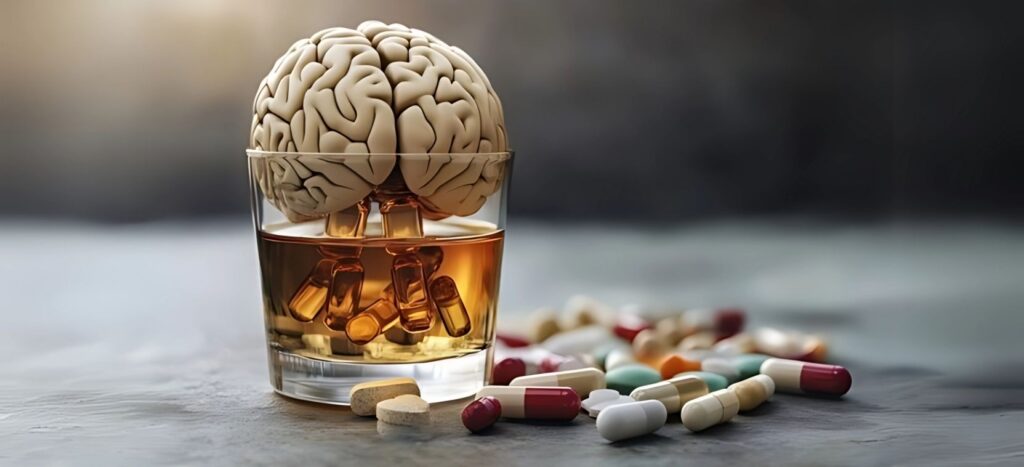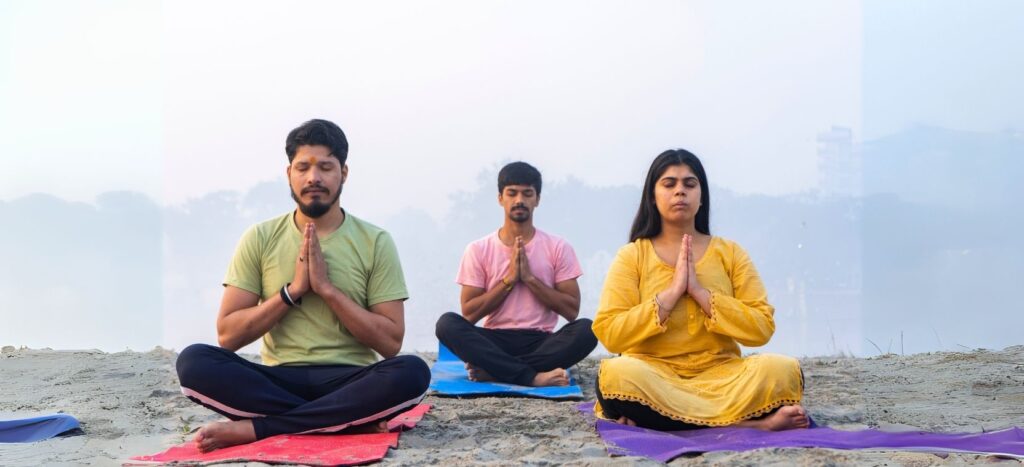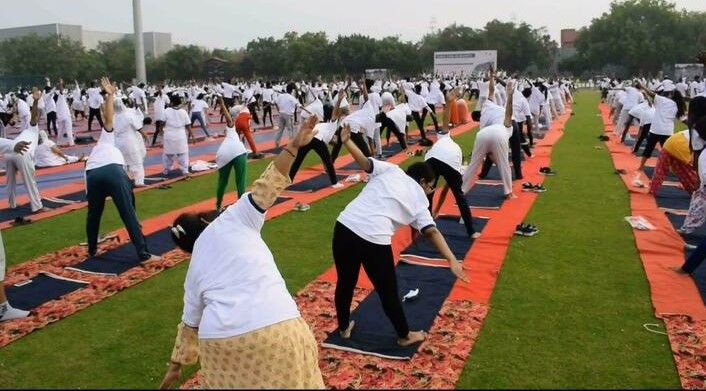
The Healing Power Within: Importance of Yoga and Meditation in Addiction Recovery
Both an addiction and a chronic case of relapsing brain illness cast a wide net: they influence the individual, the family, and the community. The road to recovery is hard. Cravings, withdrawal symptoms, and constant relapse threaten the pathway to recovery. Medical treatment and often psychotherapy have their roles, but yoga and meditation offer great exploration during the recovery process. They provide a path to healing, extending beyond physical considerations to include psychological and spiritual aspects of addiction.
Understanding addiction’s hold:

Addiction disrupts the brain’s reward pathways and sets in motion a vicious cycle of dependency and compulsive behaviour. The object or activity of dependency then effectively occupies the centre stage of a person’s life, leaving virtually no space for others. These dependencies bring about changes in the body and the mind that render breaking free extremely difficult. Recovery itself, however, would require more than mere abstinence from the abused substance; it must also address the underlying issues that drove the individual into addiction in the first place. It is in this respect that yoga and meditation play their essential roles.

The art of yoga combines physical postures (asanas), breathing techniques (pranayama), and mental focus, making it an excellent tool against drug and alcohol addiction. Yoga provides significant benefits during the recovery period from addiction:
- Alleviation of Withdrawal Symptoms: Poorly managed withdrawal signs characterise the initial days of recovery. Yoga asanas, including restorative practices, calm the nervous system, thereby easing withdrawal symptoms; they relieve muscular tension and promote sleep. Deep breathing exercises may further aid in reducing anxiety and curbing cravings.
- Stress and anxiety reduction: Stress is a major trigger for relapse. Mindfulness and breathwork, essential components of yoga, help modulate the stress response, lowering anxiety levels and bringing emotional balance. A regular practice helps equip the individual with coping skills for dealing with stress without succumbing to the temptation of addictive substances.
- Physical health restoration: Almost always, addiction wreaks havoc on physical health. Yoga may restore physical well-being through improved cardiovascular function, increased muscle strength, and enhanced flexibility, while also supporting recovery initiatives through improved immunity. Rejuvenated physical vitality offers an enhanced sense of self-worth, which augurs well for motivating recovery efforts.
- Heightened self-awareness: Yoga encourages introspection and self-reflection. Mindful movement and breath help the practitioner sense how they relate to their own body, emotions, and thoughts in the present moment; thus, increased awareness of oneself can support chemical dependency recovery by identifying triggers for cravings and developing healthy responses.
- Fostering Resilience: Recovery Is a Bumpy Road. Yoga provides resilience through discipline, perseverance, and self-compassion. One becomes more resilient in dealing with challenges on the mat, which is similar to sustaining that resilience while recovering.
- Meditation: Cultivating Inner Peace and Clarity:
Meditation, holding the mind’s attention to a single point: either the breath or a mantra, is a powerful tool for recovery from drug addiction. This technique works well in conjunction with yoga to calm the mind and facilitate emotional regulation. Some of the benefits of meditation in recovery from addiction include: -
- Craving Reduction: Meditation can still the noise in one’s mind and thereby ameliorate the cravings. In this way, an individual learns to put his or her mind in the present moment and to observe the cravings without being controlled by them.
- Emotional Regulation Improvement: Given that addiction often arises from an inability to cope with difficult emotions, meditation trains emotional awareness and acceptance, allowing individuals to witness their feelings non-judgmentally and develop more adaptive ways of coping.
- Mindfulness Improvement: The moment of now, filled with non-judgmental awareness, is the essence of meditation. Mindfulness enhancement promotes awareness of thought processes, feelings, and sensations, allowing one to actively choose a response instead of automatically responding to cravings or triggers.
- Chiselling Self-Compassion: The experiences accompanying addiction often weigh heavily with shame and guilt. Cultivating self-forgiveness through meditation for past errors enables the individual to bond with themselves and the recovery process with compassion and understanding.
- Nurturing the Spirit: The world of addiction for many is a spiritual void. Meditation aids in reclaiming inner connection and imparting purpose and meaning, thus rooting the native spirit for everlasting recovery.
Yoga and Meditation in Recovery:

Combining yoga and meditation therapy with traditional cognitive-behavioural models of counselling will significantly aid in the treatment of alcohol and drug addiction. These are time-honoured practices that can be integrated at many points in the recovery process from detox to aftercare:
- Detox: Yoga supports withdrawal symptom relief during detoxification, making it a bit easier to cope with. Restorative poses and deep breathing calm the nervous system and reduce anxiety.
- Rehabilitation: Yoga and meditation help with cravings during rehabilitation by enhancing coping methods, reducing stress, and strengthening emotional resilience. These practices can also help foster self-awareness and promote a sense of connection to the body and mind.
- Aftercare: Continuing a program of yoga and meditation upon the conclusion of a rehabilitation program can aid in the ongoing efforts to remain sober and avoid a relapse. These activities provide additional support and a connection to the road of recovery.
Finding Support and Guidance:
Seeking instruction from experienced yoga and meditation instructors who work with individuals in recovery is essential. Many addiction treatment programs and recovery communities offer yoga and meditation programs directed at the needs of those in recovery. Joining a support group can also be encouraged, where needed.
Conclusion:

Though yoga and meditation are not a panacea for addiction, they are potent healing and transformative tools. They can help lay a path of development through addressing the physical, mental, and spiritual facets of addiction, then allowing the person to break the cycle of dependence and start erecting a structure for a healthy, balanced, and sober life. It is a long road to recovery, not a sprint, and yoga and meditation provide the tools to walk this road with grace, resilience, and tranquillity. By engaging in these practices, one can tap into internal strength and discover the healing power within.
Yoga and meditation are not a magic cure for addiction, but they offer powerful tools for healing and transformation. By addressing the physical, mental, and spiritual dimensions of addiction, these ancient practices can empower individuals to break free from the cycle of dependence and build a foundation for a healthy, fulfilling, and sober life. The journey to recovery is a marathon, not a sprint. Yoga and meditation provide the necessary tools to navigate this journey with grace, resilience, and inner peace.
By embracing these practices, individuals can tap into their inner strength and discover the healing power within.





